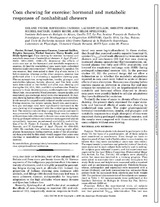Mostrar el registro sencillo del ítem
Coca chewing for exercise : hormonal and metabolic responses of nonhabitual chewers
| dc.contributor.author | Favier, Roland | |
| dc.contributor.author | Cáceres, Esperanza | |
| dc.contributor.author | Guillon, Laurent | |
| dc.contributor.author | Sempore, Brigitte | |
| dc.contributor.author | Sauvain, Michel | |
| dc.contributor.author | Koubi, Harry | |
| dc.contributor.author | Spielvogel, Hilde | |
| dc.date.accessioned | 2017-10-09T18:17:38Z | |
| dc.date.available | 2017-10-09T18:17:38Z | |
| dc.date.issued | 1996 | |
| dc.description.abstract | Abstract. To determine the effects of acute coca use on the hormonal and metabolic responses to exercise, 12 healthy nonhabitual coca users were submitted twice to steady-state exercise (∼75% maximal O2 uptake). On one occasion, they were asked to chew 15 g of coca leaves 1 h before exercise, whereas on the other occasion, exercise was performed after 1 h of chewing a sugar-free chewing gum. Plasma epinephrine, norepinephrine, insulin, glucagon, and metabolites (glucose, lactate, glycerol, and free fatty acids) were determined at rest before and after coca chewing and during the 5th, 15th, 30th, and 60th min of exercise. Simultaneously to these determinations, cardiorespiratory variables (heart rate, mean arterial blood pressure, oxygen uptake, and respiratory gas exchange ratio) were also measured. At rest, coca chewing had no effect on plasma hormonal and metabolic levels except for a significantly reduced insulin concentration. During exercise, the oxygen uptake, heart rate, and respiratory gas exchange ratio were significantly increased in the coca-chewing trial compared with the control (gum-chewing) test. The exercise-induced drop in plasma glucose and insulin was prevented by prior coca chewing. These results contrast with previous data obtained in chronic coca users who display during prolonged submaximal exercise an exaggerated plasma sympathetic response, an enhanced availability and utilization of fat (R. Favier, E. Caceres, H. Koubi, B. Sempore, M. Sauvain, and H. Spielvogel.J. Appl. Physiol. 80: 650–655, 1996). We conclude that, whereas coca chewing might affect glucose homeostasis during exercise, none of the physiological data provided by this study would suggest that acute coca chewing in nonhabitual users could enhance tolerance to exercise. | es_ES |
| dc.language.iso | en | es_ES |
| dc.publisher | Journal of Applied Physiology | es_ES |
| dc.subject | METABOLISMO DE LA GRASA | es_ES |
| dc.subject | HORMONAS GLUCORREGULADORAS | es_ES |
| dc.subject | ACTIVACIÓN SIMPATO-ADRENAL | es_ES |
| dc.subject | EJERCICIO SUBMÁXIMO | es_ES |
| dc.title | Coca chewing for exercise : hormonal and metabolic responses of nonhabitual chewers | es_ES |
| dc.type | Article | es_ES |

